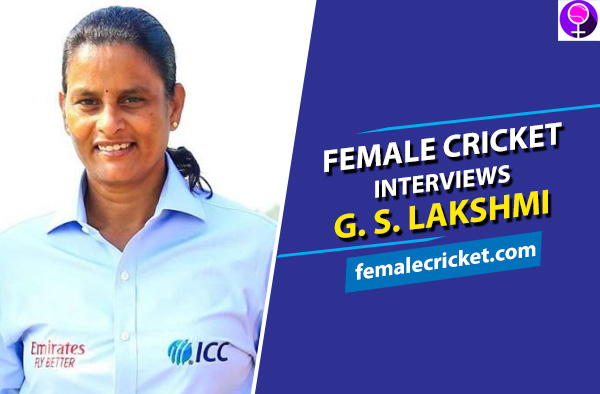She created history in 2018 when she became the first woman match referee to officiate a men’s ODI. She is also the first woman onto the ICC International Panel of Match Referees. Her rise to glory from a cricketer to a match referee has been nothing less than stellar. With the experience of playing the sport professionally for over 20 years, she is unequivocally, one of the best in the match officiating business.
We are talking about Gandikota Sarva Lakshmi. Female Cricket got in touch with this talented cricketer turned match referee, to know more about her exciting journey.

Excerpts from the interview
How are you keeping yourself busy during the lockdown?
After a long time, I have got such a big break. I am making the most of it and catching up on things that I have missed doing over all these years. I have hit the kitchen after quite some time (smiles). My daughter and my mother used to serve me when I was busy, but now, I have taken the onus of preparing different cuisines for them. Apart from the daily household chores, I perform yoga and meditation. On the work front, I have made use of this break to revisit my basics of cricket laws. Also, the BCCI’s initiative to conduct online sessions has been very helpful. I appreciate the effort of Mr. KVP Rao and his team for putting together the online sessions.
Going back 35 years, tell us about your early days in cricket.
Back those days, I had no idea that women’s cricket has a certain structure in our country. I started off with gully cricket playing with my brother. I played just in my colony till the 10th standard. After the board exams, when I went out to seek admission for higher education, I found it difficult, courtesy of my atrocious marks (chuckles). My parents were worried. The second-best college in Jamshedpur, the city in which I was born and brought up, denied admission to me.
Then, with utmost optimism, we went to the top college in the city. As expected, at first, I was refused admission there. Then the college principal asked whether I was good at anything else. My father’s boss, who had accompanied us, told me that I play cricket. From the principal’s office, we headed straight to the ground. I was asked to bowl. That was the first time I had seen and held a leather ball. To everyone’s surprise, I bowled really well. I also took some good catches. Looking at my cricketing skills, I was offered admission not in the second-best, but in the topmost college of Jamshedpur (smiles). My parents heaved a sigh of relief, so did I. This was in the year 1986 when I actually started playing cricket professionally. I not only represented my college but also the Bihar state team and east zone that year.
After playing for Bihar for three years, you moved to Andhra. You played for South Central Railways. How did you get that break?
In 1988, I was selected for India camp, of which Rajani Venugopal was also a part. Rajani played an instrumental role in my shift from Bihar to Andhra.
Actually, before that, there was a funny incident that happened when I met Rajani for the very first time. I vividly remember that senior nationals final, when Bihar locked horns against Andhra. The Andhra girls were talking in Telugu and passing comments on our Bihar team. The girls were of course oblivious to the fact that I was a Telugu. After the match, I walked up to Rajani to tell her that I understood everything that her team was saying during the match (smiles).
Some of those words were aimed towards me as well. Rajani apologized and that is how our friendship started. As our bond grew, she asked me whether I would like to join South Central Railways. Thinking from cricket as well as a job security standpoint, I thought it was a good idea. I joined South Central Railways in 1989. My parents were happy to know that I had bagged a secure job, which would also allow me to pursue my passion of playing cricket. During that time, Mr. Pillai asked me if I would play for Andhra. I played for the state for three years.
In 1991, you were at crossroads, when you had to choose between cricket and marriage. Tell us about that.
My father passed away in 1990. There was pressure on my mother to get me married and settle me down. However, my cricketing career had just begun and I was in no mood to let it go. For my mother’s sake, I agreed, however, I had just one condition; my, to be in-laws should allow me to pursue my passion of playing cricket.
Fortunately, they agreed. I got married in 1991. On the day of my marriage, I got a call from my sir, who informed me that I was selected in the Rest of India team. It was a very big thing for me. However I had made up mind, and that day I chose nuptial over cricket. In my mind, I was clear, that I would make my comeback soon. To my utter disbelief, I was caught at crossroads, when just after a few months of marriage, I conceived. Honestly, at that time, I didn’t want to start a family as I had a bright cricketing future in front of me. I went to the hospital but the doctor there warned me of complications that could surface if I wished to procrastinate. I slept over it and the very next day, I decided o keep the child. In the hindsight, I have no regrets at all.
You made your comeback in 1995. Were you happy to be back on the cricket field?
I made my comeback in 1995 for South Central Railways. My daughter was around three years old by then. My mother used to come home to take care of her. Full credit goes to my mother, as it is because of her I could return to the cricket field. In that year itself, I was selected in the Indian Railways team, courtesy of my good performance for South Central. I feel getting into the 15 of Indian Railways is easy, but making a cut into the playing XI is a Herculean task.
The joy of making a comeback was soon subdued as more often than not I was warming the bench. I hardly played any games for Indian Railways. Though I didn’t get too many chances, it did not deter me from putting in my 100 percent. I worked very hard for four years.
However, I could not see myself wasting any further time. Age was also not on my side, as I was nearing 30. In 1999, I asked the captain to relieve me. Thankfully, she had no objection. I returned to the Andhra team. That year I was the highest wicket-taker in the domestic season, which guided me to make it into the Indian team.
In 1999, you were selected in the Indian team. How was that feeling?
At the outset, I was very happy, as I had achieved my dream of representing India. However, my joy was short-lived as I did not get a chance to be in the playing XI. It was very frustrating. But I still kept going because it was my passion that didn’t allow me to call it quits. I could not imagine my life without cricket.
You were selected in the Indian Railways again in the year 2000. Did things change for good after your first stint with them?
Things were still the same. I was still warming the bench. Finally, in 2004, I made my way back to the Andhra team. I also led the south zone for two years. I also played for South Central Railways for a couple of years.
In 2007 you hung up your boots as a player and took to coaching. How was the experience?
I took up coaching in 2007. My first assignment was the South Central Railways. To my joy in 2009, we won the inter-railway tournament. I was happy to be on the winning side, first as a player and then as a coach. After this, I got a chance to coach Hyderabad Women’s U-19. I enjoyed coaching. Later, I was handed over the responsibility of the selector for the south zone.
When did you get the opportunity to become a match referee?
While I was juggling between coaching and selector assignments, match referee thing came up. In 2008, for the first time, the BCCI allowed women to match referees. We were five of us. The criteria back then were that only Indian players were permitted to become match referees. Thankfully, I had the India tag.
Now that you have been around as a match official for close to 12 years, how were your early days as a match referee?
Honestly, the five of us who were selected in 2008 by the BCCI, seldom knew anything about the role of a match referee. The reason being we never had any match referees for women’s matches. I clearly recall we had a seminar for a couple of days. We attended the sessions. We were also given books and we were expected to understand the cricket laws. We also learned from other men match referees. My first assignment as a match referee was the senior women’s one-day tournament in Anantapur.
How has the structure for match referees evolved over the years?
Between 2008 and 2013, the individual state cricket associations used to send two names for the role of the match referee. There was no structure as such in place for match referees, unlike umpires. Finally, in 2014, BCCI thought of having a panel of match referees, just like a panel of umpires to ensure continuity in the system. The Board along with Simon Taufel conducted an examination for the selection of match referees. A total of 125 players applied, out of which eight were women. 50 were shortlisted, out of which five of us were females. After clearing the exam, I got a chance to officiate boys’ U-16 domestic games.
Apart from the domestic matches, you have been a match referee for international games. Tell us about that.
When the BCCI promoted the Indian match referees to the ICC panel, I got the opportunity to officiate international games. In 2018, I was a part of the team of match referees for a tri-series between UAE, Scotland, and Ireland, that was played in the UAE. Then in 2019, I got the chance to be in the officiating team for the men’s World T20 qualifiers that were held in Dubai. And just before the outbreak of the COVID-19 pandemic, I was in Australia for the Women’s World T20.
Finally, if you are asked to pick up one role that you enjoyed the most, which one would it be; player, coach, selector, or match referee?
That’s a tough one. Honestly, I have enjoyed being a player as much as I have enjoyed being a coach. The joy of winning that you get as a player and as a coach is simply wonderful. Be it training together, playing together, and the resultant camaraderie that you develop as a player with your teammates, it is great. Now that I have smoothly transitioned into my second innings, in which I am a match referee, I love my job. I feel the BCCI has done a great job as far as encouraging women cricketers to take up roles such as umpires, match referees, scorers, inter alia.

I am a former cricketer having represented Mumbai University at All India University level. I was a part of MCA probables for the U-19 and U-23 age group. I have been an avid cricket writer for the last five years. Currently I am pursuing my Ph.D from IIT Bombay.